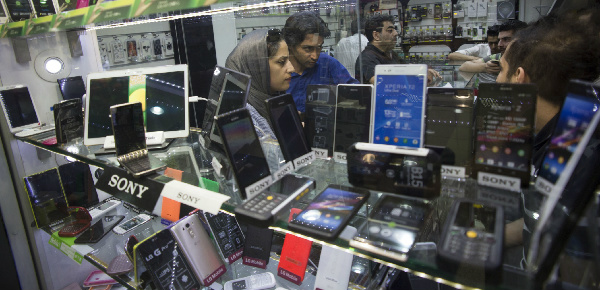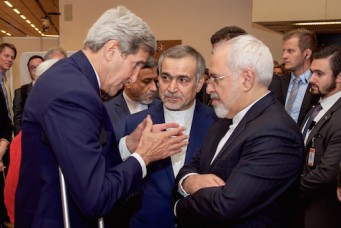Why Human Rights Is Good Business in Post-Deal Iran
Amid all the excitement over an Iran deal, there has been scant discussion of Iran’s dismal human rights record. The lifting of sanctions presents an opportunity not only for big profits, but gains in the country’s human rights standards.

Customers browse in a smartphone shop at Tehran’s Paytakht computer center, September 2, 2014. Morteza Nikoubazi/ZUMA Press/Corbis
Even before the dramatic announcement of a final nuclear deal between Iran and the permanent members of the United Nations Security Council plus Germany (P5+1) in Vienna, speculation began about the economic bonanza that could result from the lifting of sanctions against Iran and its reintegration into the global market.
In post-sanctions Iran, reinvigorated oil revenues, a rising middle class of consumers with a taste for global brands, and an already growing tourism industry are predicted to create major moneymaking opportunities for European and North American companies seeking to do business in the Islamic Republic. With the country’s vast natural resources and educated population of nearly eighty million, it is no surprise that the Middle East’s last untapped market has foreign investors salivating over potential profits.
Amid all the excitement over the Iran negotiations, there was scant discussion of Iran’s dismal human rights record. The lifting of sanctions presents an opportunity not only for big profits, but gains in the country’s human rights standards. Foreign corporations, and the governments that regulate their activities both at home and abroad, stand to play a major role in attaching human rights norms to the renewal of economic ties.
Over the past decade, the application of human rights standards to business has increased in global importance, starting in 2005 with the appointment of a United Nations expert on business and human rights, and a resulting framework of guiding principles. While the initial focus of this growing practice within international law was to encourage state accountability for human rights violations committed by (third party) private actors, the question of what responsibilities corporations have in upholding these same standards has also become increasingly important.
As a chronic human rights abuser, Iran has no shortage of violations that potential investors and governments should be aware of. Among the problems that stand out are a soaring execution rate, discriminatory laws against women, persecution of ethnic and religious minorities, the targeting of journalists and dissidents, and the dismantling of labor unions.
While the terms of the nuclear deal do not tie human rights reform to the lifting of sanctions, the opportunity to do so in another way remains. Corporate actors looking to invest in the country can be as responsible for encouraging and upholding human rights as governments. And governments, ultimately charged with the monitoring and oversight of corporate actors under their jurisdiction, should establish and enforce the regulation needed for model corporate behavior.
As a start, foreign investors looking to partner on tourism ventures can insist that any business relationship be conditioned on gender parity in the workplace. This can counter recent initiatives, such as the Reducing Women’s Work Hours Bill (introduced by the outgoing Ahmadinejad administration and passed by parliament in late 2014), aimed at curtailing women’s participation in the workforce.
Companies seeking to invest in Iran’s oil and gas sector could qualify such deals on stringent environmental and labor standards. Investors exploring the potential for construction of hotels, shopping malls, and retail chains should link their investment to better rights protection for Afghan refugees, who are often tasked with this manual labor. And companies seeking to enter Iran’s telecommunications market must be apprised of the state’s monitoring of communications and use of this information in the repression of its citizenry, before making any decision to partner in this sector.
Just as the startup scene in Iran is being lauded as a hub of innovation and source of potential solutions to social and economic problems in the country, big business should lead by tethering their investment to human rights standards that will set the tone for socially responsible investment in a post-deal Iran. Some states, like Namibia, Brazil, and Japan, have already taken the initiative by incorporating discussion of Iran’s adherence to human rights standards in ongoing bilateral talks concerning increased business and trade ties, and advising corporate actors within their jurisdictions accordingly.
In a world where corporations regularly turn a blind eye to state surveillance and other human rights violations, such talk might sound overly idealistic. But there are cases where the reintegration of a country’s economy into the global market has gone hand-in-hand with (relative) progress in human rights. A closed and oppressive regime, the Burmese junta moved toward democratic and social reforms on the promise of renewed business ties with the outside world. The result has been not only economic, but political liberalization. In Iran, where a corrupt kleptocracy of clerics and militias controls much of the economy, the promise of lucrative trade with the West might, ironically, provide incentives for political reform.
Aside from the human rights implications, enforcing market-wide standards is also good business: studies show that global buyers are becoming more mindful of their consumerism, and are willing to pay more for products and services provided by companies that are committed to positive social and environmental impact.
Many argue that doing any business with Iran will extend the lifeline of a repressive political regime. The removal of sanctions will effectively eliminate the legal tools for preventing investment in Iranian businesses. The best way forward is for both corporate actors and governments to link human rights reforms with the promise of renewed economic ties with the Islamic Republic.
A version of this article originally appeared on July 19, 2015.
Gissou Nia is a human rights lawyer who most recently served as deputy director at the International Campaign for Human Rights in Iran, and prior to that as the executive director of the Iran Human Rights Documentation Center. She has also worked on war crimes and crimes against humanity trials at the International Criminal Court and the United Nations International Criminal Tribunal for the former Yugoslavia. She has contributed to the Huffington Post, Foreign Policy, and CNN. On Twitter: @GissouNia.
Subscribe to Our Newsletter



